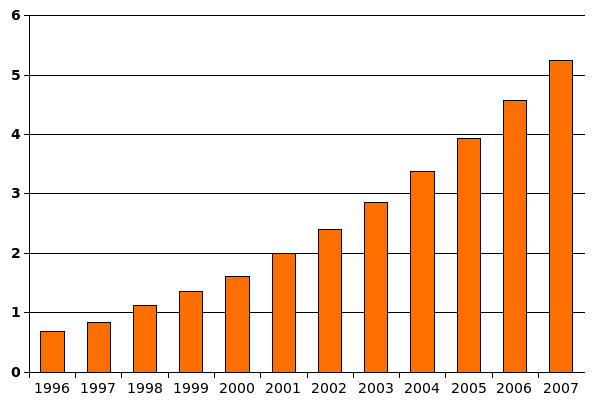GcMAF Therapy for Autism
For the treatment for Autism Spectrum Disorders (ASD) and immune system diseases.
Autism Spectrum Disorders (ASD)
Autism Spectrum Disorders (ASD) are neurodevelopmental diseases characterized by impaired social interaction, repetitive behavior and deficient language and social skills.
Reports of autism cases per 1,000 children grew dramatically in the US from 1996 to 2007.

The rapid increase in the number of autism cases in such a short period of time suggests that environmental factors are responsible for or a significant contributing factor in these types of diseases. However, complexity arises due to interactions among multiple genes, the environment and epigenetic factors which do not change DNA but are heritable and influence gene expression.
Conventional Management of Autism
More than half of US children diagnosed with ASD are prescribed psychoactive drugs or anticonvulsants, with the most common drug classes being antidepressants, stimulants and antipsychotics. Aside from antipsychotics, there is little reliable research about the effectiveness or safety of drug treatment for adolescents and adults with ASD. A person with autism may respond atypically to medications, these can have adverse effects and as yet no known medication relieves the core symptoms of social and communication impairments typical of autism.
Essentially, conventional management of autism does not address the cause of the disease and only attempts to treat the symptoms.
The Immune System and Autism
Recently it is becoming clear that immune system dysfunction plays an important role in autism.
Altered Immunity in Individuals with Autism
Immunological abnormalities involving cytokines, immunoglobulins, inflammation and cellular activation have been noted in individuals with autism.
Alterations in various immune cells including natural killer cells and macrophages have also been observed in individuals with autism. On stimulation, NK cells from individuals with autism showed diminished cytotoxic activity.
Macrophage Migration Inhibitory Factor (MIF or MMIF)
A cytokine recently linked to autism is a macrophage migration inhibitory factor (MIF). MIF is a pro-inflammatory immune regulator that is constitutively expressed in brain tissues and has important influences on neural and endocrine systems. This macrophage migration inhibitory factor cytokine is produced by neuroendocrine and immune tissues. A macrophage migration inhibitory factor possesses glucocorticoid-antagonist properties within the immune system and participates in the regulation of several endocrine circuits.
- Plasma levels of the macrophage migration inhibitory factor (MIF) were higher in individuals with autism.
- Individuals with autism with the highest levels of plasma MIF were found to have the most severe behavioral symptoms.
- The macrophage migration inhibitory factor is of critical importance for the host response to microbial infections and in several autoimmune diseases.
- The macrophage migration inhibitory factor expression usually constitutes at low levels.
Immunoglobulin Levels
- Decreased levels of total plasma IgG and IgM have been observed in a large group of individuals with autism.
- The reduced levels correlated with behavior, such that individuals with autism with the most severe behavioral symptom scores had the lowest IgG and IgM levels.
Altered Sensitivity to Environmental Toxicants – PBDEs, Immunity and Autism
The complex interplay between immunological and environmental factors may have a role in autism. Polybrominated diphenyl ethers (PBDEs) are environmental toxicants that impact on neurodevelopment and immunity. Individuals with ASD have different immune sensitivity to the environmental toxicant.
GcMAF Therapy for the Treatment of Autism
Second-generation high-dose GcMAF immunotherapy is administered to overcome the problem of immune system dysfunction including that of the macrophage migration inhibitory factor (MIF) which plays an integral role in autism and leads to commonly observed symptoms.
Treatment
- Recommended dose – 0.25ml High-Dose GcMAF administered twice weekly by intramuscular or subcutaneous injection. *
- Some improvements in symptoms should be observed within two months.
- Minimum treatment course of 6 months should be expected but each individual patient is different and additional courses may be required based on positive progress.
- Patients may need longer-term maintenance doses of GcMAF to stay well and symptom-free until their immune system is developed enough to cope with any challenges.
* Dosage recommendations apply only to the Second-Generation GcMAF of Saise Mirai clinic.
If you wish to purchase GcMAF therapy or make an enquiry, please contact us with details of your illness, current treatment and the quantities of Gc-MAF you require.
References
- Goines P, Van de Water J. The immune system’s role in the biology of autism. Current Opinion in Neurology (2010) 23(2):111-7.
- Fingerle-Rowson GR, Bucala R. Neuroendocrine properties of macrophage migration inhibitory factor (MIF). Immunology and Cell Biology (2001) 79:368–375













